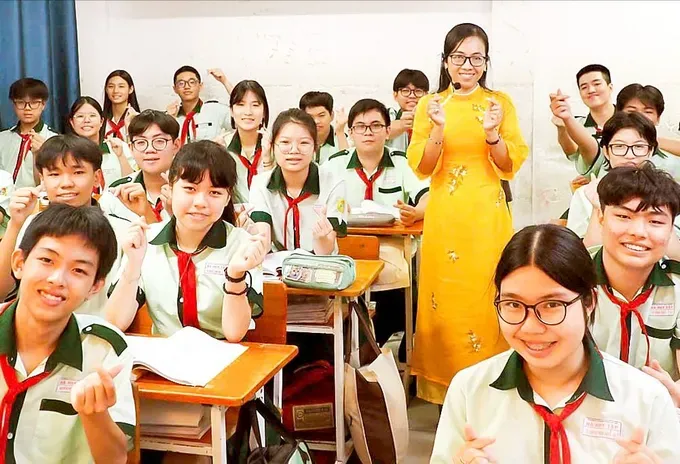
August is the time when localities seek to hire teachers in anticipation of the upcoming school year. This year, the recruitment process has been delayed compared to previous years due to the reorganization of administrative boundaries and the establishment of two-tier local governments. The education sector has proposed many solutions to overcome the surplus and shortage of teachers in localities.
In the 2024-2025 academic year, within Ho Chi Minh City Region 1 (previously known as Ho Chi Minh City), 29 out of 129 public non-business units have been granted the authority to independently recruit teachers. This includes two kindergartens, 19 high schools, two junior high schools - high schools, one special general school, three centers dedicated to supporting the development of inclusive education, and two secondary schools. The overall requirement for teacher recruitment in the 2024-2025 academic year stands at 5,762 individuals; however, only 2,556 have been successfully recruited, resulting in a recruitment rate of 44.3 percent.
To address this issue, for the 2025-2026 academic year, the Department of Education and Training of Ho Chi Minh City has submitted a document seeking the opinion of the People's Committee of Ho Chi Minh City regarding the policy of empowering the Department of Education and Training to manage the recruitment of teachers for public service units under the jurisdiction of the People's Committees of wards, communes, and special zones, in a timely manner to ensure adequate staffing for the upcoming school year.
In agreement with this proposal, during the recent online conference on the decentralization of state management in education, particularly the implementation of the two-tier local government model, Deputy Minister of Education and Training Pham Ngoc Thuong stated that with the delegation of teacher recruitment responsibilities to the Department of Education and Training, there are currently 34 recruitment councils across the nation. Candidates have the opportunity to apply for multiple admission preferences. Should a candidate fail to meet the criteria for recruitment as a teacher in their designated commune, they are permitted to seek admission in another commune, thereby enhancing their chances of being recruited. This strategy also enables localities to optimize their teacher recruitment resources.
At present, the Department of Education and Training in Ho Chi Minh City is compiling support policies from various localities prior to the merger with formerly Binh Duong and Ba Ria - Vung Tau provinces to provide recommendations for developing support policies for the teacher network. These recommendations will be submitted to the Ho Chi Minh City People's Council for approval, aimed at implementation for the 2025-2026 academic year.
Furthermore, the department is augmenting the number of ‘orders’ from pedagogical institutions; leveraging recruitment channels via the civil servant recruitment initiative aimed at outstanding students and young researchers from the Ho Chi Minh City People's Committee to enhance the pool of teacher candidates across all educational levels.
Additionally, the department is increasing the number of 'orders' from educational institutions and utilizing recruitment channels through the Ho Chi Minh City People's Committee's civil servant recruitment initiative, targeting exceptional students and young researchers to expand the pool of teacher candidates across all grades.
At a prior working session in late April 2025, General Secretary To Lam, alongside representatives from the Government Party Committee and central ministries, discussed the implementation of the Central Committee’s resolutions on education and training, as well as preparations for a new Politburo resolution on advancing breakthroughs in education and training development. During this session, the General Secretary directed the education sector to explore a plan to engage singers, artists, painters, and athletes in training gifted students within general education institutions.
Subsequently, in his Official Dispatch No. 61/CD-TTg, the Prime Minister instructed the People's Committees of provinces and centrally-run cities to mobilize and encourage artists, artisans, athletes, and experts to participate in organizing cultural, artistic and sports activities as well as fostering the development of gifted students in schools.
This initiative addresses the shortage of teachers for specialized subjects in general schools, aligning with the teaching requirements of the 2018 General Education Program. However, the managing authority should establish additional regulations on standards, recruitment mechanisms, and quality assessment for these resources to ensure teaching quality meets the demands of general education institutions.
























